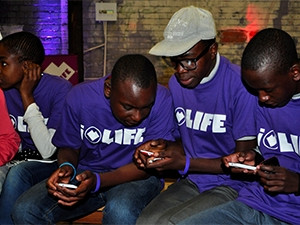
HIV youth development initiative loveLife is using cellphones to actively engage with South Africa's youth to change behaviour, encourage leadership and help tackle the HIV/Aids pandemic.
LoveLife's new mobile site allows young people to access important information through their cellphones, with ambitious plans to sign up a million young people in the next two years.
The iloveLife.mobi site launched last month and has around 3 000 young people signed up so far. Over 2 200 of these are regular and active users, and loveLife plans to grow this number to 140 000 active monthly users over the next two years.
LoveLife head of digital, Jade Archer, says cellphones have helped to democratise Internet access in South Africa and allow young people to reach information in an accessible and affordable way.
"LoveLife has been working with young people for 16 years and in that time we have developed real expertise in talking to young people in a way that is open, engaging and exciting. Through iloveLife, we really aim to engage with young people in an authentic way that is honest, non-judgemental or patronising.
"Mobile offers us an opportunity to take this expertise and package content, and offer it to millions more young people than we could ever engage with through our face-to-face interaction," adds Archer.
LoveLife's call centre still takes around 3 000 calls a day from young people seeking advice or an ear to listen to their worries and problems. Archer says the organisation knows it needs to stay relevant in an increasingly digital world and to have a visible presence in the spaces young people operate in.
"We do this through traditional online platforms like our Web site, Mxit, Facebook and other social platforms, but we really wanted to create a home for young people online that offers advice, information and support during their journey through the sometimes challenging adolescent years."
Rewarding initiative
The interactive digital platform is aimed at young people between the ages of 10 and 24, and covers topics ranging from extremely sensitive and serious matters such as rape, sexual abuse, cyber bulling and suicide, to advice on relationships, family planning and sex.
"Our research revealed mobile penetration is extremely high. Even in low income communities, about 50% of teenagers have their own cellphone. So we decided to invest in a programme that offered young people rewards for investing in their personal development and for taking action in the real world through a really fun and engaging mobile platform," says Archer.
The mobile site offers rewards for "life affirming, empowering, and healthy behaviour". Everything users do on the site scores points which can win them prizes, such as clothing store shopping vouchers. The site also hopes to stretch further than the virtual world and encourages users to attend loveLife events and festivals, and take preventative tests regularly which will also score them more points on the mobi site.
"Through iloveLife we hope to offer a home to young people that rewards them directly for investing in themselves by tackling some of these topics. Ultimately, we hope iloveLife will become a replacement to the other forces that drag young people into risky situations every day," says Archer.
Youngsters do not have to own a smartphone to access the site. It has been designed for all mobile devices and also has a USSD service for those with basic cellphones.
"We know that the most marginalised young people in South Africa won't be able to access the mobi site due to poor 3G coverage, and as a result, we wanted a platform that offered access no matter how rural their locations," says Archer.
The mobi site lets young people get help for a wide range of problems but has not forgotten about the initiative's main goal to reduce risky sexual behaviour and the associated high HIV prevalence among young people. LoveLife will also track the number of HIV tests that can be attributed to the site, with an aim to have 500 000 young people take HIV tests by June 2017.
Share